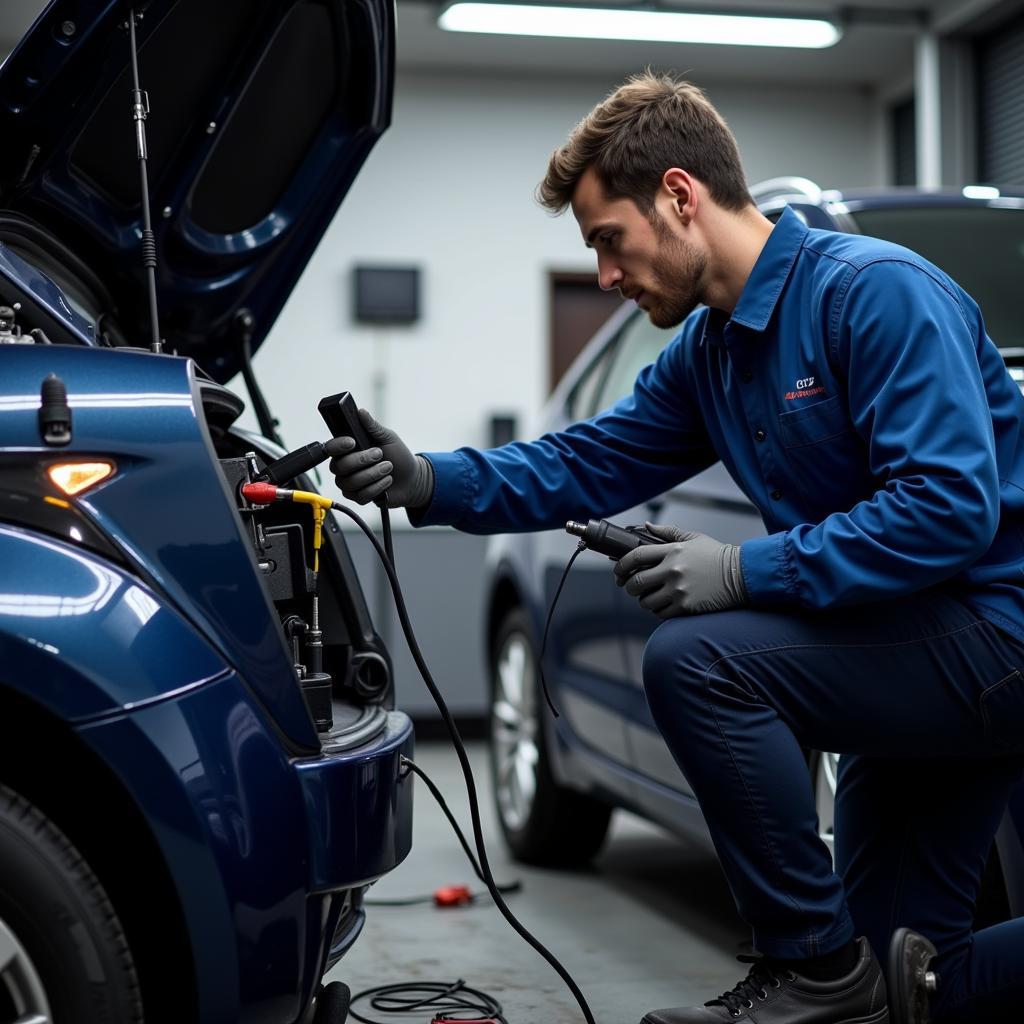When your car starts acting up, a trip to the diagnostics car garage is often the first step towards a solution. But what exactly happens in those high-tech bays, and how can you be sure you’re getting the most out of your visit? This comprehensive guide explores everything you need to know about diagnostics car garages, equipping you with the knowledge to navigate car trouble with confidence.
 Car diagnostic tools plugged into a vehicle's computer system
Car diagnostic tools plugged into a vehicle's computer system
Understanding the Importance of Car Diagnostics
Modern vehicles are complex machines, relying on intricate networks of sensors, actuators, and computer systems to operate smoothly. When a problem arises, a “check engine” light or other warning signals may illuminate on your dashboard. This is where car diagnostics come into play.
Think of car diagnostics as a conversation with your car. Using specialized car garage diagnostics meter, technicians can communicate with your vehicle’s onboard computer, retrieving valuable data about its health and performance. This data is crucial for identifying the root cause of the problem, rather than just addressing the symptoms.
What Happens at the Diagnostics Car Garage?
A typical visit to a diagnostics car garage involves the following steps:
- Problem Assessment: The technician will begin by asking you about the symptoms you’ve noticed, such as unusual noises, warning lights, or performance issues.
- Vehicle Scan: Using a diagnostic scanner, the technician will connect to your vehicle’s OBD-II port, usually located under the dashboard. The scanner retrieves diagnostic trouble codes (DTCs) stored in the car’s computer, providing clues about potential issues.
- Data Analysis: The technician will then interpret the DTCs, often referencing manufacturer databases and technical manuals to understand the meaning and potential causes.
- Further Inspection: Depending on the DTCs and the technician’s assessment, further inspection may be necessary. This could involve visually inspecting components, testing electrical systems, or using specialized tools for in-depth analysis.
- Diagnosis and Repair Plan: Once the technician identifies the root cause of the problem, they will provide you with a diagnosis and a recommended repair plan, outlining the necessary steps and estimated costs.
The Benefits of Timely Car Diagnostics
Ignoring warning signs or delaying a visit to the diagnostics car garage can lead to more severe and costly problems down the line. Here are some key benefits of timely car diagnostics:
- Early Problem Detection: Identifying issues in their early stages allows for quicker and often less expensive repairs.
- Preventative Maintenance: Regular diagnostics can help identify potential issues before they escalate into major problems, saving you time and money in the long run.
- Improved Performance: Addressing underlying issues can optimize your vehicle’s performance, fuel efficiency, and overall driving experience.
- Enhanced Safety: By ensuring all systems are functioning correctly, diagnostics contribute to a safer vehicle for you and your passengers.
Choosing the Right Diagnostics Car Garage
Not all diagnostics car garages are created equal. Here are some factors to consider when choosing where to take your vehicle:
- Reputation and Experience: Look for a garage with a solid reputation for quality service and experienced technicians.
- Technology and Equipment: The garage should be equipped with the latest diagnostic tools and software to ensure accurate and efficient diagnostics.
- Transparency and Communication: Choose a garage that values transparency, clearly explains the diagnostic process, and provides detailed reports.
- Customer Service: A good diagnostics car garage will prioritize customer satisfaction, offering friendly and helpful service.
Common Car Diagnostic Questions
Q: How often should I get my car diagnosed?
A: As a general rule, it’s recommended to have your car diagnosed at least once a year or whenever you notice any unusual symptoms.
Q: Can I diagnose car problems myself?
A: While affordable OBD-II scanners are available for personal use, they may not provide the same level of detail or accuracy as professional-grade equipment. Additionally, interpreting the data and diagnosing complex issues often requires specialized knowledge and experience.
Q: How much do car diagnostics cost?
A: The cost of car diagnostics can vary depending on the complexity of the issue, the make and model of your vehicle, and the garage’s hourly rates.
Diagnose Car Trouble with Confidence
A trip to the diagnostics car garage doesn’t have to be a daunting experience. By understanding the process, benefits, and factors to consider when choosing a garage, you can approach car trouble with confidence. Remember, timely diagnostics and preventative maintenance are key to keeping your vehicle running smoothly for miles to come.
If you’re experiencing car problems in Bradford or Basingstoke, consider the services of mobile car diagnostics bradford and mobile car diagnostics basingstoke. For those in Cape Town looking for reliable car diagnostic tests, car diagnostic test cape town offers expert services. And for those interested in exploring the top car diagnostic tools available, be sure to check out the top car diagnostic tool guide.
